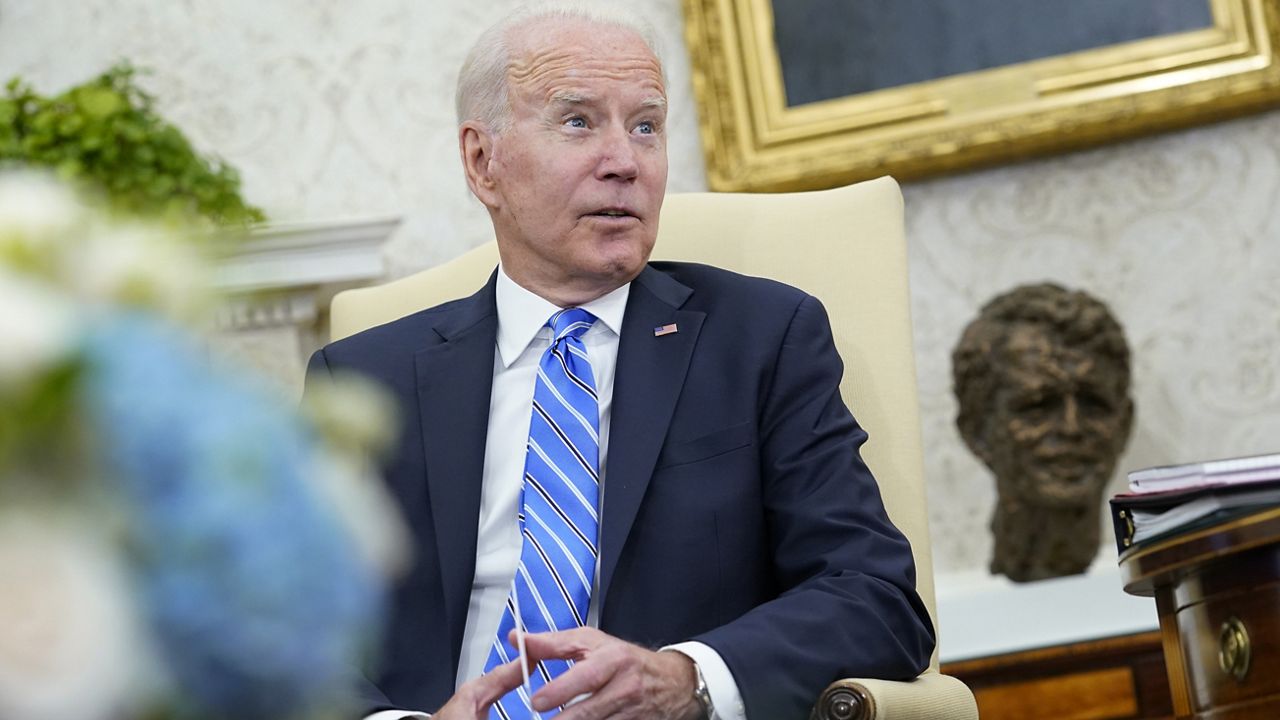President Joe Biden attempted to clarify his comment from last week that social media giants like Facebook are “killing people” by hosting misinformation about the COVID-19 vaccines on their platforms.
The president said Monday that he hopes Facebook doesn't take it "personally" and urged the platform to take action against vaccine misinformation.
"I meant precisely what I said," Biden said in response to a question from CNN after remarks Monday on the economy. "I'm glad you asked me that question."
"Facebook isn’t killing people," Biden continued. "These 12 people are out there giving misinformation. Anyone listening to it is getting hurt by it. It's killing people. It's bad information."
Biden appeared to be citing a March study by the Center for Countering Digital Hate, a nonprofit which studies extremism, that linked a dozen accounts to spreading the majority of vaccine disinformation on Facebook.
"My hope is that Facebook, instead of taking it personally, that somehow I'm saying Facebook is killing people, that they would do something about the misinformation, the outrageous misinformation about the vaccine," Biden clarified. "That's what I meant."
When asked if Biden would take steps to hold Facebook accountable if they don't take more action to stop misinformation, Biden replied that wasn't the goal of his remark.
"I'm not trying to hold people accountable, I'm trying to make people look at themselves, look in the mirror," Biden said. "Think about that misinformation going to your son, your daughter, your relative, someone you love. That's what I'm asking."
Last week, Surgeon General Dr. Vivek Murthy issued an advisory warning about the dangers of health misinformation and recommending measures to blunt its impact.
"Surgeon general advisories are reserved for urgent public health threats," Murthy said at Thursday’s White House press briefing. "And while those threats have often been related to what we eat, drink and smoke, today we live in a world where misinformation poses an imminent and insidious threat to our nation's health."
The surgeon general is calling on practically everyone to do their part to disrupt the spread of misinformation: individuals, families, communities, tech companies, schools, health professionals, journalists and others.
“I am urging all Americans to help slow the spread of health misinformation during the COVID-19 pandemic and beyond,” Murthy says in the advisory, adding: "Limiting the spread of health misinformation is a moral and civic imperative that will require a whole-of-society effort.”
Health misinformation is nothing new, but tech platforms, including social media, have made it easier to circulate falsehoods, Murthy said. During the pandemic, false and misleading information has been shared about COVID-19, masks, social distancing, treatments and vaccines.
A Kaiser Family Foundation poll in May found that 67% of unvaccinated U.S. adults believed at least one major myth related to the virus or weren’t sure whether it was true. An analysis of millions of social media posts by researchers at the Massachusetts Institute of Technology found that falsehoods were 70% more likely to be shared than the truth. And a study published in the journal Nature Human Behaviour found that even brief exposure to misinformation could dissuade someone from getting vaccinated.
“Modern technology companies have enabled the misinformation to poison our information environment with little accountability to their users,” Murthy told reporters. “They've allowed people who intentionally spread misinformation — what we call disinformation — to have extraordinary reach. They've designed product features such as 'like' buttons that reward us for sharing emotionally charged content, not accurate content. And their algorithms tend to give us more of what we click on, pulling us deeper and deeper into a well of misinformation."
Facebook on Friday responded to Biden’s attack, with spokesperson Kevin McAlister saying, “The facts show that Facebook is helping save lives. Period.”
The company also released a blog post saying its internal research showed it was not responsible for Biden’s missed vaccination goal.
"The data shows that 85% of Facebook users in the U.S. have been or want to be vaccinated against COVID-19," Guy Rose, the company's VP of Integrity, wrote in a blog post Saturday. "President Biden's goal was for 70% of Americans to be vaccinated by July 4. Facebook is not the reason this goal was missed."
"We’re not in a war or battle against Facebook," White House press secretary Jen Psaki insisted Monday. "We’re in a battle with the virus."
But Psaki ramped up pressure on the companies to share information on how many Americans are exposed to misinformation on their platforms and how their secretive and powerful algorithms promote false content to users.
"Do you have access to information from these platforms as to who is receiving misinformation?" she asked. "I don’t think that information has been released. Do you know how the algorithms are working at any of these platforms? I don’t think that information has been released."
Biden’s comments come as the White House has struggled to counteract resistance to getting a shot, particularly among younger and more Republican demographics. Fewer than 400,000 Americans are getting their first vaccine dose each day — down from a high of more than 2 million per day in April. More than 90 million eligible people have not received a dose.
Spectrum News' Ryan Chatelain and The Associated Press contributed to this report.



